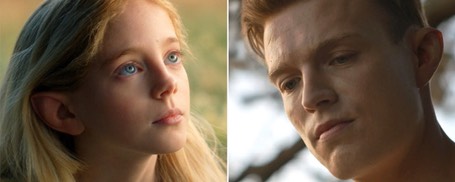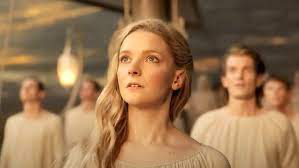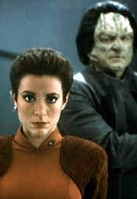There’s been a great deal of discussion about the conversation between little Nerwen and her big brother Finrod at the start of The Rings of Power. Critics are saying things like: Elves know physics! They build boats! They know perfectly well why a ship floats.

This image is cited in:
https://www.dailyhindnews.com/finrod-in-the-rings-of-power-who-is-galadriels-brother-in-the-lord/ Image of Little Nerwen and her big brother
That, of course, is true. At least one Elf all Tolkien fans know of is a skilled ship builder—and Cirdan is not alone. But, as this article points out, Finrod is not trying to teach his little sister about physics.

This image is cited in:
https://www.themarysue.com/what-did-finrod-say-to-galadriel-in-the-rings-of-power/
As the author above points out, Finrod has just broken up a fight (some very astute fans noted this is a subtle reference to the Kinslaying and the theft of ships in Tolkien’s legendarium), and he’s trying to teach his small sister how to discern right action. Young Galadriel points out that light can be reflected, and reflected light is not the true light. “How am I to know which light to follow?” she asks.
What Finrod answers is troubling. Sometimes, he tells her, you must touch the darkness in order to find the light. Troubling though this answer is, we see it in action throughout the series, as Galadriel struggles not only with external evil, but with the evil in her. She is the ship, but also the stone.
In episodes 2 and 8, especially, we see absolutely masterful imagery of light, water, and light on water. Galadriel is, of course, associated with water; she will eventually wield the ring of water and use its power to protect beauty and innocence. This imagery culminates in LOTR, in the phial she gives Frodo that contains the light of the silmaril Earendil, Elrond’s father, carries through the heavens. The light is held in water.
In TROP, Galadriel's association with water is made very clear. One of her first acts is to use water to reveal a hidden truth—that the fortress she and her troops are exploring in the far North was indeed Sauron’s lair. And, in the final episode, Elrond tells how, when he was a boy, Galadriel befriended him and gave him water. So we see that Galadriel uses water to give life and reveal truth—just as she later does in LOTR.
But water can also take life. In the second episode, we watch Galadriel’s desperate swim in the deep ocean. She struggles to follow the light that will lead her back to land and to what she conceives as her duty. We see refugees drown when their raft is attacked by a sea monster, and we see Galadriel, herself, nearly drown when she is swept overboard. It’s no accident, I think, that she sinks in the shape of a cross. Finally, there is the vision she and Miriel share, of the drowning of Numenor.
If water is ambiguous and light sometimes deceiving, how is Galadriel to discern right action? Here, I think, is where Finrod’s advice really comes in to play. He doesn’t mean that we need to look for shadows to find the light. He certainly doesn’t mean that we should deliberately seek out darkness! At least I don’t think so. Then what does he mean?
Let’s look at what Galadriel actually does in this first season. What is her moral journey? Where is her low point, and what does she do afterwards? Finally, where is she at the end of this arc?
To me, her absolute low point is in her interrogation of Adar. Here, she reminds me of another heroine: Kira Nerys in Deep Space Nine.

One of the finest episodes of the first Season—and indeed, of the entire show—is Duet. In this episode, Kira interrogates a man who—as she believes—presided over a concentration camp in which hundreds of thousands of her people were cruelly killed. She wants him dead. Her anger, though understandable, is disturbing.
Galadriel is just as cruel and unforgiving toward Adar. As with Kira, we understand Galadriel, but we’re meant to see she is wrong. She has touched the darkness. Interestingly, it’s Halbrand who holds her back from murder, as she held him back shortly before.
I believe this—not the eruption of Mount Doom later in the episode—is Galadriel’s nadir. But she has already shown wisdom and self-awareness that will lead her up, toward the light. In episode five, she speaks of her soldiers, her king, and her friend, all of whom refused to support her quest:
“Each of them acted as they did because I believe they could no longer distinguish me from the evil I sought.”
Later, after the disaster of Udun, Galadriel leads young Theo to safety. Their interactions were very moving to me. The young boy thinks it good that Galadriel has killed too many orcs to count. She answers him: “It darkens the heart to call dark deeds good. It gives place for evil to thrive inside us. Every war is fought both without and within.” She also counsels him not to take blame for actions that were not wholly his fault—and she gives him her sword.
Giving her sword to a child she has rescued and counseled is a powerful symbol of the renunciation of redemptive violence. it is still more powerful when, at the end of the season, she gives up Finrod’s dagger so that the rings can be forged.
Before she gets to this point, she must face a final temptation. Once again, as Sauron reveals himself, we experience the imagery of water and light. Galadriel is again at sea; again in danger of drowning. Halbrand, revealed as Sauron, presents her with one last temptation. Will she join with him to save Middle Earth?
“Save, or rule? “ she asks him.
“I see no difference,” he answers, and her decision is made. She has faced her darkness. She will not rule over unwilling subjects; she will not call dark deeds good.
And Elrond’s hands pull her from the water, and she is free. This is when, when she asks him to prove his identity, he tells her how she gave him water when he was a child.
It is only after this powerful temptation and her successful resistance that she’s able to do what is needful to help forge the rings.
Throughout this first season, Galadriel is both ship and stone. As she says, she leapt from the ship carrying her to Valinor, the earthly paradise, “because I believed I was not yet worthy of it.” In this, she is correct. She takes a long step toward redemption in these last two episodes, but we won’t see her journey end until more than three thousand years later, when she encounters Frodo in Lothlorien. Then, after that temptation and that choice, she will finally be worthy of the ship to Valinor. Then she will have found the light.
